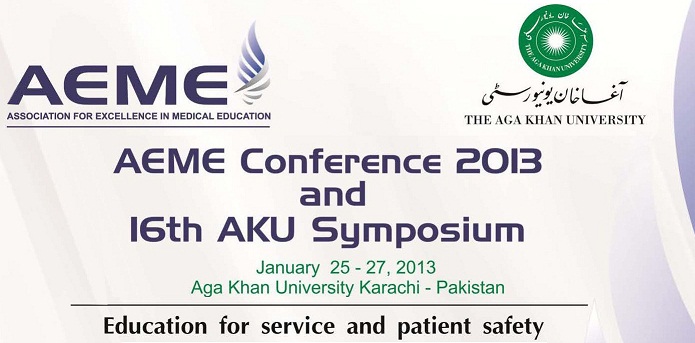Day 1 : Poster Presentations (Theme: Teaching and Learning)
Contribution of basic sciences laboratory sessions in medical education: an overview
Location
Auditorium Pond Side
Start Date
26-1-2013 3:30 PM
Abstract
Background: Department of Biological and Biomedical Sciences (BBS) offer undergraduate medical students a state of art lab, which is well equipped with modern instruments and well trained staff.
Methods: Students have the opportunity to learn basic and modern diagnostic techniques as required in the fields of anatomy, biochemistry, pharmacology and physiology. Module-wise approach has been adapted to design laboratory sessions in such a way that all the disciplines are well integrated. Since the establishment of the Medical College at Aga Khan University, biochemistry discipline has introduced latest diagnostic techniques, such as radio-assays, chromatography and protein electrophoresis in laboratory sessions. To keep pace with expanding research in basic sciences and development in molecular diagnostic techniques, new advances have continuously been introduced, replacing older techniques with more sophisticated instruments and procedures.. For example, the electrophoresis followed by scanning on a densitometer has been replaced by scanning on a gel doc. Likewise introduction of ELISA plate reader gives students an idea of microanalysis and rapid procedures instead of the use of conventional spectrophotometer. The laboratory sessions involving polymerase chain reaction (PCR), DNA electrophoresis, recombinant DNA techniques have been offered as a diagnostic tool because the expansion of molecular biology techniques have made it possible to diagnose several diseases including the infectious diseases.
Results: The biochemistry laboratory sessions are designed so students can correlate their results with clinical scenarios. Several reports have confirmed that undergraduate laboratory sessions and research experiences provide scientific knowledge, practical skills, understanding of the nature of science, teamwork abilities, and developing interest in science.
Conclusions: Students enthusiastically participate in these sessions because these labs serve as nurseries where students are nurtured as future scientists and physicians.
Key words: Biochemistry ,lab sessions, curriculum
Contribution of basic sciences laboratory sessions in medical education: an overview
Auditorium Pond Side
Background: Department of Biological and Biomedical Sciences (BBS) offer undergraduate medical students a state of art lab, which is well equipped with modern instruments and well trained staff.
Methods: Students have the opportunity to learn basic and modern diagnostic techniques as required in the fields of anatomy, biochemistry, pharmacology and physiology. Module-wise approach has been adapted to design laboratory sessions in such a way that all the disciplines are well integrated. Since the establishment of the Medical College at Aga Khan University, biochemistry discipline has introduced latest diagnostic techniques, such as radio-assays, chromatography and protein electrophoresis in laboratory sessions. To keep pace with expanding research in basic sciences and development in molecular diagnostic techniques, new advances have continuously been introduced, replacing older techniques with more sophisticated instruments and procedures.. For example, the electrophoresis followed by scanning on a densitometer has been replaced by scanning on a gel doc. Likewise introduction of ELISA plate reader gives students an idea of microanalysis and rapid procedures instead of the use of conventional spectrophotometer. The laboratory sessions involving polymerase chain reaction (PCR), DNA electrophoresis, recombinant DNA techniques have been offered as a diagnostic tool because the expansion of molecular biology techniques have made it possible to diagnose several diseases including the infectious diseases.
Results: The biochemistry laboratory sessions are designed so students can correlate their results with clinical scenarios. Several reports have confirmed that undergraduate laboratory sessions and research experiences provide scientific knowledge, practical skills, understanding of the nature of science, teamwork abilities, and developing interest in science.
Conclusions: Students enthusiastically participate in these sessions because these labs serve as nurseries where students are nurtured as future scientists and physicians.
Key words: Biochemistry ,lab sessions, curriculum

